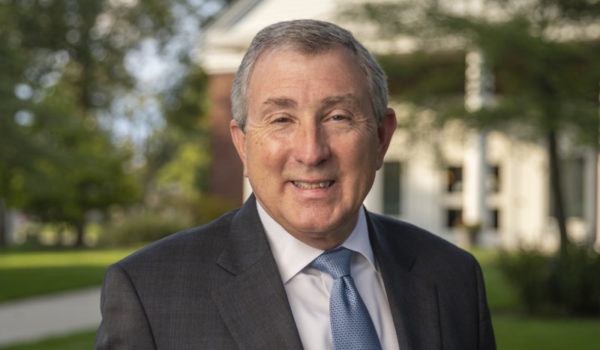
Franklin College and its new president have a long history together
By Glenda Winders
Kerry Prather is quite possibly the most qualified person on the planet to be the new president of Franklin College. Since becoming the assistant basketball coach in 1982, he has held positions that have acquainted him with every aspect of life on campus.
A year after he was hired, the head coach left, and Prather moved up to a spot that would be his for the next 37 years. Two years later, he also took on the additional role of athletic director, and in conjunction with those jobs he served two stints as interim vice president before becoming the interim president in January 2020. Through four college administrations he was on the executive cabinet, and through his friendships with past presidents he has their guidance and counsel as he assumes his new role.
“Normally an incoming president is somebody new being introduced to all of the constituencies, but I’m anything other than that,” he says. “I’ve had a lot of on-the-job training.”
As basketball coach, Prather led the Franklin Grizzlies to five conference championships, four league tournament titles, five appearances in the National Collegiate Athletic Association Division III national tournament and one in the National Association of Intercollegiate Athletics national tournament, but he shies away from taking the credit.
“Good players make good teams, and they make the coach look good,” he says. “I’ve been blessed.”
Coaching success
One of the players on that NAIA tournament-winning team, David Dunkle, is now a family practice physician and president and CEO of Johnson Memorial Health. He still calls Prather “Coach.”
“As a player, I always felt supported by him, and I always felt that as a team we were well-prepared,” Dunkle says. “Coach has always been detail-oriented and has never believed in cutting corners. He helped instill his players with the understanding that success is a process. You must be prepared, and you must be willing to work hard if you expect to be outstanding. I’m not surprised that he has ascended to the presidency of Franklin College. He loves the college; he loves the people there, and he loves the city of Franklin.”
James Due, a senior vice president at Northern Trust and president of the Franklin College Board of Trustees that appointed Prather, echoes Dunkle’s sentiments.
“Kerry is a natural leader,” Due says. “Given the circumstances that necessitated appointment of an interim president, it was essential that we select an individual with leadership strength and the ability to facilitate not only stability but lead the college forward with credibility and assurance of a collaborative environment. It became evident very soon after his appointment as interim president that Kerry should be the next president. His passion for Franklin and his pragmatic understanding of its students and mission are second to none. He is an astute professional, and it is an honor to work with him.”
The way Prather landed his first job at the college, however, was entirely accidental. After growing up in Loogootee and graduating from Indiana University with degrees in English and education, he was teaching and coaching at South Decatur High School. When the football coach, Mike DeBord — who would go on to coach for the University of Michigan, the Seattle Seahawks and the Chicago Bears — went for an interview at Franklin, Prather decided to ride along with his friend. While DeBord interviewed, Prather visited with the basketball coach, who told him they had an opening on their staff. So began Prather’s career at Franklin College.
The family that works together …
Today Prather refers to the college as “the family business.” His wife, Cindy, served for 23 years in the education department before becoming a higher education consultant. Last year she returned to campus to become the director of teacher education and teacher licensing adviser. Their daughter, Katie, graduated from the college in 2013 after having her mother as one of her professors. Katie is now a fourth-grade teacher. Son Robbie, an attorney who graduated with the class of 2017, was one of the basketball players his father coached.
From the beginning of their two-career marriage, the couple knew that the only way to have a family life would be to do everything together. They all went on Prather’s talent-scouting trips and to his games.
“We’ve changed diapers in more gyms than I can possibly count,” he says, laughing.
But he turns serious when he talks about what has been accomplished in the last four decades, as well as what still needs to be done for an ever-changing student population.
“It’s a balancing act between what I call being true to your soul institutionally and staying on the cutting edge of what students want and what the market demands,” he says. “We’ve got to stay on the front end of how this education serves students best.”
To that end, he spearheaded the digital fluency project made possible by a $1 million Lilly Endowment for Charting the Future grant. He says the program enables students to build on their liberal arts foundation and content-specific education by having access to the most modern technological applications. As examples he points to education students who teach to avatars in virtual classrooms, journalism students who use apps to research stories and students in the highly respected science programs who use ultrasound technology. A facility is currently being renovated to house the Center for Tech Innovation.
“We think the combination of a really broad liberal arts education with technical expertise is a perfect blend,” he says.
Prather says the school is committed to giving students an advantage as they compete in their career fields with graduates from other schools. Another way they do this is to meet annually with successful alumni who work at such companies as Lilly, Salesforce and Cummins to find out what they wish they had learned and what might have been more helpful in their college curriculum.
A spinoff from the digital fluency initiative has been Esports, competitive video gaming that Prather says is the athletic piece of the digital age. He says there is some correlation between gaming and such careers as software development as well as in the gaming industry itself. For the first time the college is recruiting gamers as they would other athletes, and they’re building an “arena” for them in Spurlock Center, where other sports are played.
Another building going up on his watch is the Johnson Memorial Health Athletics Annex, which will house retractable batting cages and enough space when they are out of the way for other sports. A second weight room is being added, thanks to a gift from Tom Allen, the head football coach at Indiana University. The facility will be named for Allen’s father, who played for Franklin and introduced such training to his team members when he got permission from the coach to bring in concrete blocks and bales of hay.
Inclusion for all
Prather is especially proud of the steps the school has taken to address issues of diversity, equity and inclusion that came into focus following George Floyd’s death last year.
“My request of the campus has been to pull together so that we can assure ourselves that each individual student is being well-served, well-supported, well-respected and recognized,” he says. “Where there are gaps in that, especially among our underserved populations, we will work together to figure out how to address them.”
Last year the cabinet had monthly meetings with representatives of both majority and minority students to identify a list of aspirations in terms of diversity and equality they’d like to achieve. Since then, several initiatives have been put into place to make them happen. For one, the school has hired Maegan Pollonais as director of the Center for Diversity and Inclusion with the mandate to involve students in achieving these goals. Prather also asked the President’s Council on Diversity and Inclusion to identify similar gaps so they can recruit and retain minorities to faculty and staff positions.
They’ve also put together a program called “Courageous Conversations” around topics of race in an effort to equip students to have conversations about differences in a way that’s productive and respectful.
“We’re trying to give them the tools to be able to tackle hard subjects in a way that’s more aimed at better understanding and better appreciation for difference in a way that isn’t uncomfortable for them,” he says. “We don’t want things to be left unsaid because people aren’t sure how to go about it or they’re afraid they’re going to say the wrong thing.”
They have sought the services of Ontay Johnson of 100 Black Men and Mind Trust, who also consults with the city on racial issues. Prather says Johnson has been helpful not only with the school’s own effort but also as a bridge to the city. Prather has been in conversation with Franklin Mayor Steve Barnett about the need to make sure the college’s progress doesn’t end at the perimeter of the campus and that students from underrepresented populations feel as welcome downtown and around the community as they do at school.
This year some 20% of students are minorities — the largest percentage ever — and Prather says he believes the synergy between all these programs can help with his goal of increasing enrollment as it brings a better atmosphere for learning to everyone on campus.
“This is exciting work,” he says. “And it’s important work.”
Raising enrollment, he says, is one of his biggest challenges since the school is in a part of the country where the demographic forecast is not encouraging. He says he hopes to do this by marketing the advantages of the Franklin experience. Thanks to being a small school, he says, classes are intimate and more personal. In addition, they have 21 varsity sports, a robust Greek system and every possible opportunity for engagement in clubs and student government.
Making it all work
Prather gives a lot of credit for his successes to Cindy, whom he met on a blind date.
“We did everything together, but she’s the one who raised the kids despite having her own professional career,” he says. “She somehow figured out how to make all of it work.”
And now she is making her new role as Franklin College’s first lady work, as well. In addition to the traditional duties of entertaining and planning receptions and events for alumni, donors, homecoming and the like, she is working on a project of her own to make a recorded history of the college by interviewing the five living former presidents and three first ladies and researching the president’s house in which they have all lived.
“I think it’s very important to preserve some of that because each one in his own way worked to enhance Franklin College and to make things better,” she says. “I also feel those women should be recognized for what they achieved in their supporting roles.”
In their rare free time, the couple enjoy travel, and they still make trips with their children when their calendars align. Prather enjoys reading fiction — his favorite author is John Grisham — but at the moment he says his reading time is taken up with articles about college affordability, quality and access.
Despite having dedicated their lives to Franklin College for the past 40 years, it seems as if the couple are just getting started.
“We are busy,” Cindy says, “but education is my passion, and it is rewarding to try to give back and to interact with all of the constituencies with whom this role allows us to interact.”
Prather adds, “At a time in our lives when we expected to be winding down, we’re winding up instead.”


